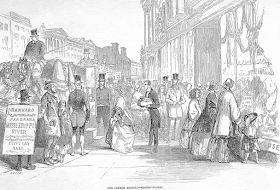by Grace Elliot
Do you like clowns?
I suspect clowns are one of those things in life (like Marmite) that fall into the ‘love ‘em’ or ‘hate ‘em’ category. Me? I find clowns creepy and they make me cringe. Sadly, in the modern age, comedians seem to be over-represented when it comes to suffering from depression – perhaps because of the pressure of being funny for a living.
Some things never change, because in 1851 when Henry Mayhew interviewed one of London’s three full-time street clowns, he discovered a pathetic figure who was ashamed of how he made his living.
Mayhew describes a sad man: “He was a melancholy looking man…whilst his face was scored with lines and wrinkles, telling of paint and premature age.”
This clown, it seems, had little to be cheerful about. Orphaned at the age of nine, he worked as a stable lad and then became a general dogs-body at Astley’s (renowned as the first circus) It was there he watched the other performers and found he had a semi-decent singing voice.
He eventually tried his luck entertaining on the streets: “With a heavy heart.”
Some days were better than others. On race days he made ten shillings, but this then had to stretch to cover the lean days. And as he records, the day his wife was in labor he worked for 10 hours straight and earnt one shilling and three pence. Many times he started work without breaking his fast (having breakfast) and didn’t eat until he’d earned enough to buy food.
What made his trade even harder were the ‘part time’ clowns, who emerged on high-paying holidays and at fairs, and taking money away from those who relied on clowning for a living. The part-timers then went back to their trades, leaving thin-pickings for the full-timers.
So how funny was the street clown? Here are some of his jokes so you can judge for yourself.
“A horse has ten legs: he has two fore legs and two hind legs – a total of ten”
“Why is the city of Rome [sic] like a candle? Because it’s in the midst of Greece.”
The street clown costume consisted of red striped stockings, full-trunks dotted red and block, and a tight top with full sleeves and frills. He wore a wig sewn into a white cap, and painted his face with grease then painted it white, coloring his lips and cheeks with vermillion.
He declined, however, to change at home as he strove to keep his trade a secret from his neighbours. This poor fellow told Mayhew how playing the fool made him feel very sad at heart, but only had to think of the bare cupboards at home to carry on. But as Mayhew goes on to write, a few minutes after their interview he spotted the clown dressed up to perform: Dancing and singing in the streets as if he was the lightest-hearted fellow in all London.
Who knows, perhaps my instinctive dislike of clowns springs from sensing their inner sadness..





The only clowns I ever saw were clowns at a circus when I was a kid, and while I found them an interesting part of the show, I never really found them funny, only silly. But I have heard that many of those "laughing on the outside" comedians are indeed "crying on the inside." When I think about it, maybe it's because they have to repress their sad moments to be funny, and so never work them through or deal with them.
ReplyDeleteOf course traditional clowns are out of fashion now, a bit like the idea of a court jester! Probably for the best.
DeleteG x
I never found clowns rolickingly funny, either, unlike a lot of the audiences at the circus performances I saw as a child. The face painted 'dripping tears' always seemed at odds with what I was supposed to do as an audience participant. Though the above clown's story is sad, indeed, going home with no money for the family to feed on wasn't actually all that unusual in Victorian times.
ReplyDeleteIt is amazing how innovative people were at finding ways to earn a living (if you can call it that.) I thought it was particularly moving how the 'clown' was ashamed of his profession and tried to hide it from the neighbours.
DeleteG x